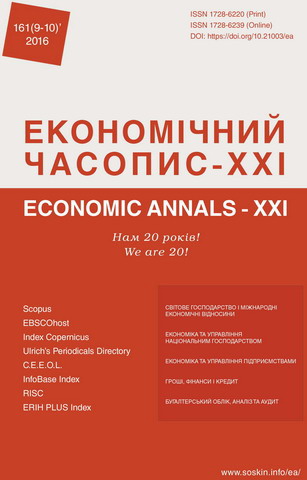Імплементація міжнародних стандартів у митне законодавство України як шлях до збільшення обсягів зовнішньої торгівлі
Implementation of international standards in customs legislation of Ukraine as a way to increase foreign trade
Author(s): Ihor Kobushko, Oleksandr Ilchenko, Sergiy DenysenkoSubject(s): Economy, National Economy, Business Economy / Management, Public Finances
Published by: Institute of Society Transformation
Keywords: Implementation; Electronic Declaration; Customs Declaration; Economic Operators: International Standards;
Summary/Abstract: Introduction. Practical implementation of the international standards in the field of simplification and harmonisation of customs procedures by Ukraine is among the most important problems, effective solution of which will increase the foreign trade of our state and its competitiveness. Many countries, impose tough documentary requirements and insufficient high level of automation of customs procedures related to movement of goods across the state border, thus creating serious obstacles to international trade. Considering the foregoing, Ukraine needs to efficiently implement international standards of simplification and harmonisation of customs procedures under national customs legislation in order to create appropriate conditions for the increase of foreign trade. The purpose of the research is to suggest a practical toolkit which will contribute to the execution of Ukraine’s international obligations regarding the implementation of international standards in the field of simplification and harmonisation of customs procedures by national customs authorities. Results. The article provides a methodical approach to the formation of the economic and legal mechanism for the implementation of simplification and harmonisation of customs procedures in the national customs legislation. Successful implementation of international standards in the Ukrainian customs legislation depends on sufficient material and technical support of divisions of customs authorities. For example, due to the high cost of laying lines for internet connection, some new border checkpoints that are located hundreds of kilometers away from the settlements are not connected to the Internet, which hinders the rapid exchange of electronic information. However, 98-99% of goods is processed electronically at the EU customs. A high level of corruption within the national customs authorities also hinders the successful implementation of international standards on the simplification and harmonization of customs procedures in Ukrainian customs legislation. The general factors of corruption in national customs authorities are the lack of professionalism of customs officers; low wages; insufficient disciplinary effect on customs officers; low level of control and responsibility at the customs; weak computerisation at the customs, etc. To solve this problem, Ukraine should modernise transport infrastructure, which in turn should lead to safe and efficient transport and customs operations; enhance facilities and provide customs authorities with modern computer hardware to perform their duties; develop qualitative and effective methods to combat corruption at the customs.
Journal: Економічний часопис - ХХІ
- Issue Year: 161/2016
- Issue No: 9-10
- Page Range: 23-26
- Page Count: 4
- Language: Ukrainian

